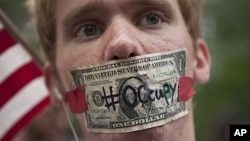Lately, the mainstream media is making parallel comparisons between the United States’ Occupy Wall Street movement and the ongoing Arab Spring. However, the linking of the two movements has outraged some Arab activists who say their movement was spawned out of decades of oppression from undemocratic leaders.
While social media has played a role in the spontaneous mobilization of both movements across many cities, Arab activists say the stakes in the Arab Spring are greater because they address the denial of fundamental civil and human rights.
Occupy Wall Street did not begin as an organized movement. Rather, it grew out of a call by Adbusters, a Vancouver-based activist network which boasts a mission to “topple existing power structures and forge a major shift in the way we live.” Last July, citing Egypt’s Tahrir Square and the 15-M youth protests in Spain, Adbusters called for a protest against what it called the “Financial Gomorrah of America.” By this they meant the financial community of Wall Street and the unharnessed control, they say, it exercises over the lives of millions of ordinary people.
Plan-as-you go movement
In response, Occupy Wall Street began to organize itself as a sort of plan-as-you go movement that gathered momentum and spread to cities across the United States.
Ed Needham is a spokesman for Occupy Wall Street in New York. He says the Arab Spring reinforced the idea that sometimes it’s necessary for citizens to take to the streets in order to effect political change.
“When your normal avenues of redress in whatever type of system you are a part of are no longer open to you or are not there to begin with, there’s a breaking point, a point where people stop and say - we’re just not going to accept the way that things are done anymore,” said Needham.
He says that in the case of the Arab Spring, a certain catalyst - the self-immolation of Mohamed Bouazizi in Tunisia- set off the imaginations of people across the region. “I think the metaphor is accurate in describing Occupy Wall Street in the way that this started as a spark and it kind of swept off across the country,” said Needham.
Others, however, argue against any comparison between the desperation that drove a hungry Tunisian to kill himself and the relatively minor discomforts of the average American during an economic downturn.
Nasser Weddady, blogger activist and Civil Rights Outreach Director at the American Islamic Congress says that while he is sympathetic to American protesters, he does not believe they have a clue about what really went on in the Middle East this year.
“Occupy Wall Street planners only see the skeleton of the Arab spring movement,” he said. “They don’t know that it was an evolutionary process, the result of decades of work, trial and error, and eventual breakthroughs. These people went out in the streets out of shared desperation after all other means had been exhausted. And they knew full well that they could die for it.”
The worst that happens in American streets, says Weddady, is that “protesters get pepper-sprayed.”
Dr. Nervana Mahmoud, a UK physician and blogger, agrees. “With no disrespect to the sense of injustice perceived by many [Americans] against the financial institutions and their corruption,” she said, “comparing their struggle to the Arab Spring denigrates the Arab protesters.”
Movement inspired by bad economy
The American protest movement, says Mahmoud, is inspired by a bad economy, not the kind of long-term abuses and economic hardships that triggered the Arab Spring. “I really don’t think the American demonstrators are willing to die for their cause,” she said. She does admit, however, to a few similarities between the movements: Both demonstrate “the savvy use of social media” and lack of “coherent plans or solutions.”
Blogger Laura Boustani is a bit more vocal in her indignation. “Shame on them!” she said. “These American protesters have no concept of the oppression Arab protesters have gone through - not that I want them to see or experience these things first-hand. Let’s just keep perspective here!”
Occupy Wall Street’s Needham does concede there is a big difference between the Arab and American movements. What they do share, he says, is a “meta-theme, the theme that, you know, everyone has certain unalienable rights and that, together, we can effect change to ensure those and provide safe-keeping for those.”
In September, October 2011 - a movement similar in purpose to Occupy Wall Street - issued a joint statement with ten Egyptian revolutionaries, among them, blogger and activist Alaa Abd el Fattah. He says that on the surface, the two movements are very different. “In the Arab world, protesters are fighting to achieve democracy. In America, people who live in democracy and enjoy a lot of rights fear that democracy may be failing them.”
However, in the end, both movement stand for the same rights and freedoms. We might do better, Fattah says, to focus not so much on our differences, but on our shared commitment to social justice and equality.
















